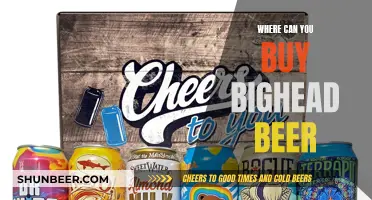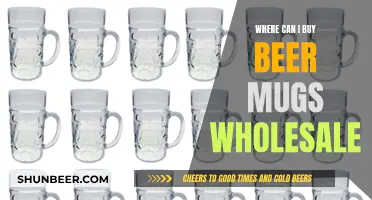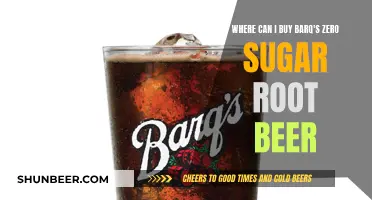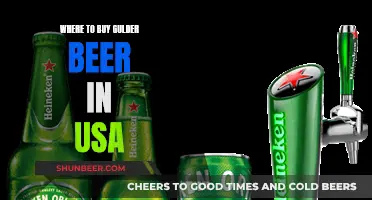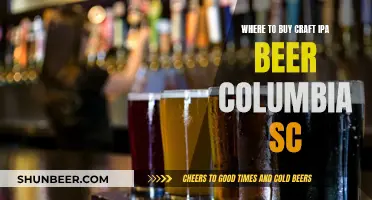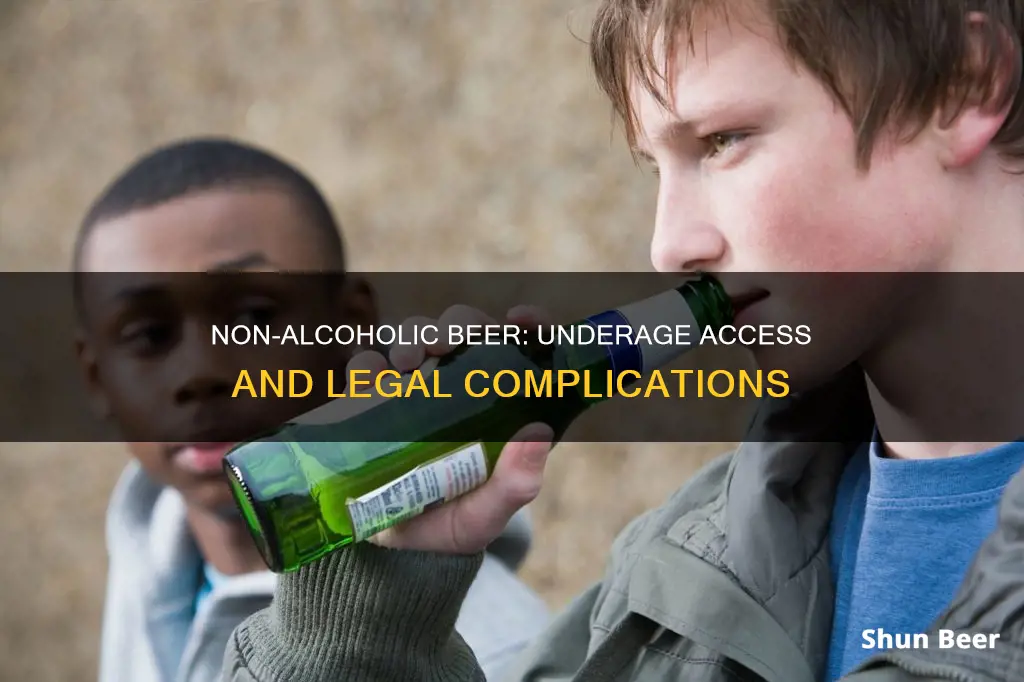
Non-alcoholic beer is a beverage that contains less than 0.5% alcohol by volume (ABV). Despite its low alcohol content, the sale of non-alcoholic beer to minors is restricted in many places. In the United States, for example, federal law prohibits the sale of alcoholic beverages to those under 21, and while some states allow minors to buy non-alcoholic beer, others do not. Even within states, policies can vary between counties and cities, and individual stores may also have their own rules. In the UK, no ID is required to buy non-alcoholic beer. While non-alcoholic beer is often marketed as a safer alternative to conventional beer, it is not completely alcohol-free, and health researchers have called for age restrictions on its sale to prevent it from becoming a gateway to drinking for children.
Can Underage People Buy Non-Alcoholic Beer?
| Characteristics | Values |
|---|---|
| ABV | Non-alcoholic beer typically contains less than 0.5% ABV. |
| Legality | The laws vary depending on the state, county, and city. |
| Age Limit | In most states, individuals under 21 cannot buy non-alcoholic beer. However, in some states, such as Ohio, the age limit is 18. |
| Parental Supervision | In some states, minors can consume non-alcoholic beer with parental permission or supervision. |
| Retailer Policies | Retail stores and online retailers may require customers to be at least 21 to avoid legal issues. |
| Health Concerns | Some health researchers are concerned that non-alcoholic beverages could be a gateway to drinking for minors. |
What You'll Learn

Non-alcoholic beer laws vary by state in the US
The laws surrounding the purchase of non-alcoholic beer by minors vary across state lines, and even within states. For example, in some states, like Ohio, minors over 18 can purchase non-alcoholic beer, while in Oregon, West Virginia, and Wyoming, minors cannot purchase beer with an ABV of 0.5% and above. In Alabama, non-alcoholic beer sales are not regulated in wet counties, but "sale" is prohibited in dry counties. In some states, like California, retailers will card for non-alcoholic beer, while in others, like Colorado, they will not.
In many states, minors cannot purchase alcohol but are able to consume it under certain conditions, such as under the supervision of a parent or guardian. In some states, minors are allowed to drink non-alcoholic beer under these same conditions. However, it is important to note that counties and cities can modify age restrictions, and individual stores may also have their own policies regarding the sale of non-alcoholic beer to minors. As a result, the laws and policies surrounding the sale of non-alcoholic beer to minors can vary significantly from one location to another, even within the same state.
Given the complexity and variation of these laws and policies, it is essential for individuals to know their local regulations and retailer policies before attempting to purchase non-alcoholic beer as a minor.
Buying Beer in the Morning: Is It Possible?
You may want to see also

Non-alcoholic beer is not completely alcohol-free
Non-alcoholic beer is often marketed as a beverage that does not contain alcohol. However, this claim is misleading as non-alcoholic beer is not completely alcohol-free. In the United States, non-alcoholic beer is legally defined as any malt beverage that contains up to 0.5% alcohol by volume (ABV). This means that while the alcohol content in non-alcoholic beer is significantly lower than in traditional beer, it is not absent.
The process of making non-alcoholic beer involves either removing the alcohol after fermentation or brewing the beer with limited sugars and yeasts to prevent the alcohol content from exceeding 0.5%. Some brands also create a beer concentrate that is diluted with regularly brewed beer to achieve an overall alcohol content below 0.5%. While the specific methods may vary, the goal is to produce a beverage that retains the taste and experience of traditional beer while significantly reducing the alcohol content.
The presence of alcohol in non-alcoholic beer, even in small amounts, has important implications. Firstly, it means that non-alcoholic beer is not suitable for individuals who need or want to avoid alcohol completely, such as those with a history of alcohol dependency, pregnant or nursing individuals, or those advised by their doctors to abstain from alcohol. Secondly, it has legal implications, particularly for minors. The laws surrounding the purchase of non-alcoholic beer by minors vary across different states and countries. In some states, minors are prohibited from purchasing non-alcoholic beer, while in others, they may be allowed to do so if they are above a certain age (such as 18 or 21) or with parental permission. The legal drinking age and the definition of an alcoholic beverage differ across states, contributing to the complexity of the regulations.
It is worth noting that many everyday foods and beverages naturally contain trace amounts of alcohol due to fermentation. For example, fruit juices like orange juice, apple juice, and grape juice can have an ABV higher than that of non-alcoholic beer. Additionally, a ripe banana can measure up to 0.4% ABV, and hamburger buns can contain up to 1.28% ABV. Despite the relatively low alcohol content in non-alcoholic beer, it is always advisable to consume it in moderation and be aware of any potential effects, especially for individuals with specific health concerns or those who are sensitive to alcohol.
Ted Seger's Beer: Where to Buy and Why You Should
You may want to see also

Some retailers will not sell non-alcoholic beer to minors
The laws surrounding the purchase of non-alcoholic beverages by minors vary across different states and counties. While the National Minimum Drinking Age Act forbids the sale of beverages containing alcohol to individuals under 21, many states have framed their own laws on the purchase of non-alcoholic drinks.
In some states, counties, and cities, retailers are not permitted to sell non-alcoholic beer to minors. For example, in Oregon and West Virginia, individuals under 21 cannot purchase beverages with an ABV of 0.5% and above. However, in other states such as Ohio, minors are allowed to purchase non-alcoholic beer as long as they are over 18.
Even in states where it is legal for minors to purchase non-alcoholic beer, some retailers may choose not to sell these products to individuals under 21. For example, a cashier at a supermarket in New Hampshire shared their experience of IDing a customer who was attempting to purchase non-alcoholic beer. The cashier noted that while there was no age restriction notification when they scanned the product, they still asked the customer for ID.
Retailers may also choose to set their own age limits for non-alcoholic beverages. For example, the owner of a zero-proof bottle shop in Maryland, where there are no state age restrictions, decided not to sell to anyone under 18.
Given the variation in laws and retailer policies, it is essential to know the local regulations and retailer policies before attempting to purchase non-alcoholic beer as a minor.
Best Places to Buy Chimay Beer: A Guide
You may want to see also

Minors may be able to drink non-alcoholic beer with parental consent
The laws surrounding the purchase and consumption of non-alcoholic beverages for minors vary across the United States. While federal law prohibits the sale of alcoholic beverages to anyone under the age of 21, the laws regarding non-alcoholic beverages are less clear.
Non-alcoholic beer typically contains less than 0.5% alcohol by volume (ABV). Despite the low ABV, many states still classify and regulate non-alcoholic beers as alcoholic beverages. This means that, in some states, minors cannot purchase non-alcoholic beer. However, in other states, it is legal for minors to purchase these beverages.
Even in states where it is illegal for minors to purchase non-alcoholic beer, it may be legal for them to consume it under certain conditions. For example, some states allow minors to consume non-alcoholic beer with parental consent or in the presence of a parent or guardian.
The laws surrounding the sale and consumption of non-alcoholic beer to minors vary not only between states but also between counties and cities. For example, in Oregon, it is illegal to sell non-alcoholic beer to minors if the ABV is 0.5% or higher, while in some dry counties in Alabama, the sale of non-alcoholic beer to minors is prohibited altogether.
Due to the complexity and variation of these laws, many retailers choose to deny the sale of non-alcoholic beer to minors to avoid legal repercussions.
Glutenberg Beer: Where to Buy and Enjoy It
You may want to see also

Non-alcoholic beer may be a gateway to drinking for kids
Non-alcoholic beer is often assumed to be an alcoholic beverage, given that it is labelled as "beer". However, non-alcoholic beer typically contains less than 0.5% alcohol by volume (ABV), which is significantly lower than traditional beers, which usually have an ABV ranging from 4-6%. In fact, many food products that we consume on a daily basis, such as fruit juices and hamburger buns, have a similar or even higher ABV than non-alcoholic beer.
In the United States, purchasing and consuming alcoholic beverages requires individuals to be at least 21 years old. However, the laws surrounding the purchase and consumption of non-alcoholic beer by minors are less clear-cut and vary across different states. While some states, such as Ohio, allow minors to purchase non-alcoholic beer as long as they are over 18, other states, like Oregon, West Virginia, and Wyoming, prohibit the sale of non-alcoholic beer to minors. In some states, the laws are even more complex and nuanced, with wet and dry counties having different regulations.
The debate surrounding the sale of non-alcoholic beer to minors has sparked concerns among health researchers and pediatricians. Some argue that non-alcoholic beer could serve as a gateway to drinking for kids, normalizing the consumption of alcoholic beverages at a young age. They draw parallels to candy cigarettes, suggesting that non-alcoholic beer could lead to an increased interest in drinking alcohol among adolescents. Additionally, the presence of well-known alcohol brands in the non-alcoholic beverage market may increase brand familiarity and the likelihood of future purchases of alcoholic products.
On the other hand, some individuals argue against government regulation, emphasizing the benefits of non-alcoholic drinks for adults who want to reduce their alcohol consumption or avoid negative health effects. They suggest that the industry can self-regulate through targeted marketing and store placement, making it clear that these products are intended for adults.
Ultimately, the decision to allow minors to purchase and consume non-alcoholic beer rests with state regulations and the discretion of retailers. However, parents and guardians must also weigh in on the potential risks and benefits of allowing their children to drink non-alcoholic beer, considering both the immediate and long-term consequences.
When Can You Buy Beer in West Virginia?
You may want to see also
Frequently asked questions
It depends on the state. While federal law prohibits the sale of alcoholic beverages to those under 21, non-alcoholic beer is defined as containing less than 0.5% alcohol by volume (ABV), which some states still classify as alcoholic. Some states allow those over 18 to purchase non-alcoholic beer, while others restrict the purchase of any non-alcoholic beer to those under 21.
As of October 2023, the following states may allow minors to buy non-alcoholic beer: Alaska, Arizona, California, Massachusetts, Minnesota, Montana, Ohio, Rhode Island, Vermont, Washington, and Wisconsin.
Some states that currently restrict the purchase of non-alcoholic beer by minors include Oregon, West Virginia, and Wyoming.


